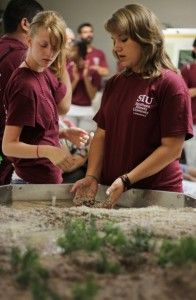SIU staff conduct high school summer camp

July 30, 2012
Dissecting tadpoles, analyzing water samples, and coring trees were some of the hands-on learning experiences Egyptian High School students were taught by more than a dozen university faculty and students during a two-week summer camp.
The camp, called the The Egyptian Experience, began in the summer of 2011 as the Egyptian High School Summer Enrichment Program after Tamms high school received a state School Improvement grant. The camp, a partnership between the university and the high school, provided two weeks of learning activities with the help of the College of Education and Human Services and the Division of Continuing Education.
Undergraduate Admissions, the Division of Continuing Education and Information Technology also participated in the program which started July 16-20 at the university and then again July 23-27 in Tamms.
Advertisement
David Ardrey, director of school partnerships and outreach for the College of Education and Human Services, said of the school’s approximately 130 students, more than half have been involved in a summer academic experience.
He said the objective is to help the students build academic skills and eventually advance to college.
Approximately 30 university faculty, undergraduate and graduate students from a variety of academic units such as curriculum and instruction, educational administration and higher education, geography, zoology and agriculture taught during the course of the camp along with Egyptian High School teachers, said Grant Miller, assistant professor of curriculum and instruction.
“The students were taught at the college level,” Miller said. “And they were very successful.”
During the course of the camp, students researched creek beds, tree trails and tadpoles and examined their relationship to the environment, said Cameron Carlson, assistant professor of educational leadership in the university’s Department of Educational Administration and Higher Education.
Working with a team led by Carlson, about 30 students created TREC, or Trust, Respect, Esteem and Caring, a student-run group that focuses on enhancing their school and learning environment, Ardrey said.
Manny Fox, a sophomore at Egyptian High School, said the group worked through obstacles to create a school mascot, chant and fight song.
Advertisement*
Fox said it helped build school spirit and helped different students connect with each other creatively.
Andrew Podoll, a student teacher at the camp and a returning doctoral student, said the students benefited from a higher level of education and the hands-on activities.
As the founder, Podoll’s not-for-profit organization called Project Eco ROVER, or Repurposed Outreach Vehicle for Education and Research, helped provide access to resources the school district doesn’t have.
Podoll helped students survey maps to look at elevation and waterways of their communities. The students then created a replica of their hometown using sand, a water system and plastic game-piece houses.
“The school is unique in that many communities come together to learn,” Podoll said. “The watershed project really helped them connect and understand their home.”
Ardrey said the university also hopes to benefit from the partnership.
“If we expose them to SIUC and offer open lines of communication, at least we’re on their radar,” he said.
The camp, Ardrey said, will also provide data that can be tracked to show the impact of the summer interactions.
The results can already be seen at the high school, Ardrey said. Improvements in attendance and test scores have been reported since the program began.
Ardrey said the students also learned to work in teams, overcome fears of public speaking, gain skills in technology and were encouraged to step outside of their comfort zones.
The students have interacted with peers they’ve never worked with before and Ardrey said it has gotten them outside of their core group of friends.
“Our hope is that these students carry back what they’ve learned to school and become student leaders,” he said. “We hope to have students teaching other students.”
Advertisement








